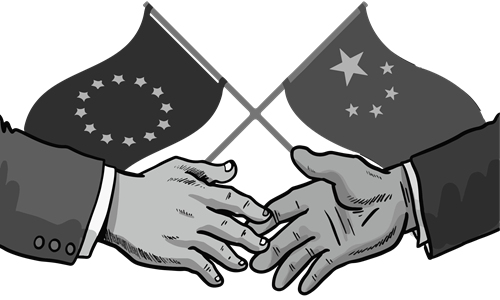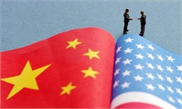COMMENTS / EXPERT ASSESSMENT
BIT not related to phase one trade deal

Illustration: Luo Xuan/GT
The China-EU bilateral investment treaty (BIT) negotiations and the China-US phase one trade deal are unrelated. Drawing connections between the two is nonsensical. The Europeans will not adopt a hard-line stance against China simply because China and the US have inked a trade deal. Despite this, it is true that a tougher attitude toward China has become a trend for the EU.Certainly, a China-US trade truce could weaken the EU's bargaining power in BIT talks. That could be a legitimate concern for the bloc which has a high dependence on trade and investment.
Though the EU has opened multiple bilateral free trade agreements (FTAs), it does not want to lose its dominant position in international trade rule making. The bloc also seeks to maintain its ability to contest the US, particularly as the two sides are also locked in a trade dispute. Thus, the EU hopes to gain an upper hand in BIT negotiations.
The joint statement of the 21st China-EU summit in April 2019 set the ambitious goal of concluding the BIT in 2020. Both sides have been in communication on that front, and the agreement will be mutually beneficial if it is successfully concluded. The BIT can provide better legal protections and a transparent business environment for Chinese companies, and can pave the road for an FTA between China and the EU. For the EU, an important investment destination for China, the BIT will enable increased foreign investment. The landmark China-EU agreement on geographical indications was signed in November, underscoring China's determination to ensure intellectual property protections.
China, the EU and the US form the most important trilateral relations in the world. Any subtle move from any party will have a far-reaching influence, and so China will carefully walk the line between the EU and the US. In 2020, it is set to speed up its opening-up process, which will be an opportunity the EU should not ignore. Against this background, China-EU BIT negotiations have opened a channel of communication for the two.
However, the more we value BIT negotiations, the easier it will be for the EU to pressure us. China needs to be cautious and optimistic, keeping an eye on the EU's new framework for foreign direct investment screening. Its policy introduced in April, following the US' footsteps, enables the EU to block foreign investments flowing into member states if it deem them a threat to national security. The EU's enhanced synchronized control of foreign investment will influence its member states. Regulation-orientation and market demand have muddled European foreign trade and economic policies - especially when it comes to China. This has also affected the progress and results of the BIT negotiations.
Most EU member states remain ambiguous about their stances toward Huawei. Some Central and Eastern European countries have excluded Huawei from the construction of their 5G networks, and the UK and Germany are hesitant to make decisions regarding the Chinese firm. 5G network construction is behind in Europe, and without technology from Chinese companies like Huawei, its 5G development will lag to the point that it is unable to compete with the US.
The EU has set the standard high for the BIT negotiations. China will have to offer a lot to make this treaty happen, but the EU should show sincerity and reciprocate all efforts. Many countries are still undecided about Huawei, a fact that could diminish China's resolution to conclude negotiations. China is likely to see a new wave of opening-up, and the EU will have to decide whether or not it wants to be a part of it.
The author is a research fellow with the Institute of European Studies, Chinese Academy of Social Sciences. bizopinion@globaltimes.com.cn



